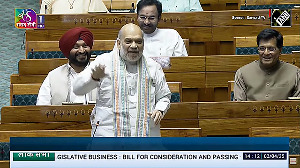It is unusual for Congress chief ministers to say no to Congress Party President Sonia Gandhi, but some of them have gathered the courage to oppose Gandhi's dream project.
At least three chief ministers have opposed the national food security bill drawn up by NGOs part of Sonia Gandhi's government-appointed National Advisory Council.
Though they have not confronted her directly, the chief ministers of Maharashtra, Rajasthan and Delhi have badgered union food minister K V Thomas into having a relook at the bill he has prepared for the Union Cabinet's approval and presentation in Parliament during the ongoing winter session.
Delhi Chief Minister Sheila Dikshit government is the latest to join the chorus of dissenters. While the Maharashtra and Rajasthan governments pursued the matter quietly without making any noise, their objections to the proposed bill are identical to those raised by Delhi Public Distribution Minister Haroon Yusuf in a letter to Thomas.
All three have pointed out that those on the NAC do not have experience of the Public Distribution System (PDS) that is supposed to deliver subsidised food grains to 75 per cent of rural and 50 per cent of urban population under the national food security law.
The Maharashtra government has opposed a proposal of the food commissions in the bill at the national and state level to monitor implementation of the proposed law. The Ashok Gehlot government in Rajasthan has objected to the Centre conducting social audit of implementation of PDS and checking the operation of the ration shops.
Yusuf said that the food security would be a flop if carried out through PDS. He pointed out that the present PDS system has already failed the government because of the large-scale diversion of food grains meant for the poorest. Its extension to cater to more population would only mean this corruption would increase more, he said.
"Better to dump the PDS and help the poor with a cash subsidy transfer as it would prevent the massive pilferage and sale of the PDS items in black," Yusuf wrote in his letter to Thomas. He pointed out that the government will have to also increase availability of food grains in the open market and fix maximum retail price at which these will be sold in retail shops.
Yusuf has laid stress on cash subsidy since the draft bill also envisages cash transfer or food coupons to the two vulnerable sections of the society in lieu of their foodgrain entitlements, proposed at 7 kg per head per month for the priority households and 3 kg per head per month for the general households.
On behalf of the Delhi government, Yusuf has also suggested that the Food Corporation of India (FCI), a central government procurement agency, is flush with stocks and hence it may be asked to open outlets at its godown to let anybody buy grains at fixed price. He has also suggested that the metropolitan cities be exempted from the bill.
The government's difficulty is that it can not put the food security bill on the back burner as it is one of the promises made by the Congress in its 2009 election manifesto to ensure a legal entitlement of subsidised food grains.
The 27-page draft bill mounted on the food and public distribution department in September and tweaked a bit by the NAC, seeks to supply 7 kg rice, wheat or coarse grains each month to those falling in the "priority households" category at Rs 3, 2 and 1 per kg respectively and at 3 kg per head at 50 per cent of the minimum support price (MSP) in case of those put in the category of "general households."









 © 2025
© 2025